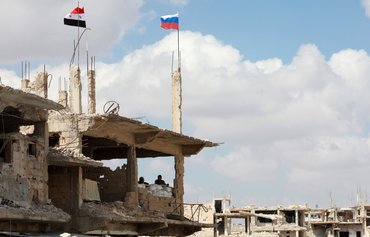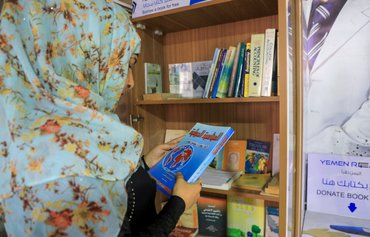Well before its military intervention in the Syrian war in 2015 to shore up the regime of Bashar al-Assad, Russia had begun implementing a soft power plan to "occupy" Syria and milk its economy through a process of cultural reorientation.
A key part of this plan was the promotion of Russian language instruction on a wide scale in Syrian schools in regime-controlled areas.
Russian language and literature departments opened in a number of Syrian universities, and Russian was introduced to primary and secondary school curricula as one of the foreign language options, when before only English and French were offered.
Russian language learning has been heavily promoted in Syria, former Aleppo University history professor Haider Zeidan said, noting that high school students see it as a ticket to leave the war-torn country and pursue their education in Russia, and thereby dodge military conscription.
![Russian textbooks issued by the Syrian Ministry of Education are used in teaching the Russian language to public school students. [SANA]](/cnmi_am/images/2021/06/09/30089-Russian-textbooks-Syria-600_384.jpg)
Russian textbooks issued by the Syrian Ministry of Education are used in teaching the Russian language to public school students. [SANA]
![Syrian children take part in a Russian language class at the Russian Cultural Centre in Damascus. [SANA]](/cnmi_am/images/2021/06/09/30090-Russian-language-class-600_384.jpg)
Syrian children take part in a Russian language class at the Russian Cultural Centre in Damascus. [SANA]
While this incentive will entice some to learn the language, the widespread teaching of Russian "will have negative repercussions for the labour market in Syria", he added, as it may affect graduates' ability to find work.
This is because Russian is not one of the languages required by local or international companies, he said, so potential job opportunities "will be limited to Russian companies or those that deal with them".
According to Syrian journalist Mohammed al-Abdullah, the Russian Cultural Centre in Damascus has been arranging and supervising language instruction courses both directly and through institutes that are co-operating with it.
Students choosing a foreign language to study now face a real dilemma, he said, as learning Russian will limit them to pursuing their studies in Russia.
"Russia is trying to make Syria, or at least part of it, a Russian colony par excellence that is not in step with the environment surrounding Syria and neighbouring countries," he said.
This policy will in turn ensure Russia's interests in Syria are safeguarded, most notably the Middle Eastern country's natural resources and the reconstruction projects that the war has brought about.
Russia views Syria's natural resources as a major prize and has set its sights on securing major reconstruction contracts.

![A Russian language class is taught at a public school in Damascus. [SANA]](/cnmi_am/images/2021/06/09/30088-Russian-language-Damascus-600_384.jpg)







They pursue the same objective in Iran. Following the Russian infiltration into the Iranian Internet network, Russia has gained a significant influence over Iranian cyberspace, and some even say that Russia is managing the Iranian Internet. When the result of a search comes back with the Russian alphabet while it has nothing to do with the search content, you realize that the Russians are trying to infiltrate or have already infiltrated.
Reply1 Comment(s)